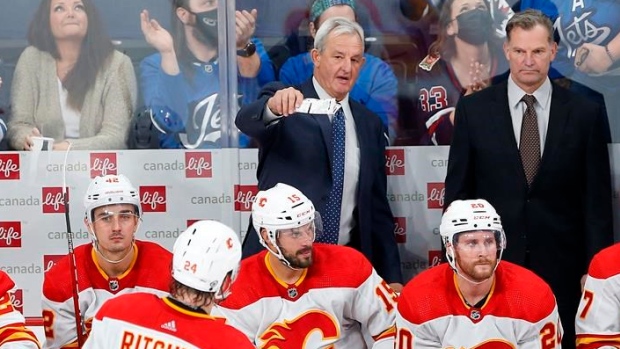Dec 29, 2022
‘Fresh’ Flames ready to return after extended break
Off since Dec. 11 due to a COVID outbreak, Calgary resumes its season Thursday in Seattle against former captain Mark Giordano and the Kraken, Salim Valji writes.
By Salim Valji

Perhaps the Calgary Flames were ahead of their time.
By getting their COVID-19 outbreak out of the way in mid-December, before other teams started placing players en masse in the league’s protocols that require at least 10 days of isolation, the Flames may have been unintentionally set up for success as they resume their season Thursday in Seattle against former captain Mark Giordano and the Kraken.
Consider that, first and foremost, no players got severely sick. Calgary never once played games short-handed or with a roster of AHL callups. When their season was paused, the Flames had played 28 games – tied for fourth most in the league – but had suited up just 11 times at the Saddledome, the third-fewest number of home games.
And, as head coach Darryl Sutter pointed out, thanks to that extended pause the team is as healthy as it has been since the preseason back in October. Depth forwards Tyler Pitlick and Brett Ritchie are back skating with the main group after recovering from injuries.
“I think the guys look fresh and they’ve got some energy in their practice, which is good,” he said on Monday. “Getting through the next three days you’re looking for good execution and pace of play, the same things you say coming out of training camp.”
The Flames now will not be tested for COVID for 90 days, but still monitored for symptoms, meaning a mass outbreak is unlikely to happen again and Calgary won’t have to rely on its taxi squad.
“Obviously, other teams are having updates every day,” Matthew Tkachuk said. “It’s happening to a couple other teams. It’s probably the way it’s going to be for the next little bit.”
When Calgary hits the ice for their first game since Dec. 11, they’ll do so as the authors of one of the league’s most surprising starts and atop the Pacific Division in points percentage (0.643).
The Flames have had stellar goaltending from Jacob Markstrom and Dan Vladar (whose five-on-five save percentage of .942 is first in the league), a deep blueline, and a handful of forwards driving their offence. Despite the hiatus, Johnny Gaudreau is seventh in the league in even-strength points (25) and Andrew Mangiapane is seventh in goals (17), while Elias Lindholm is third in plus-minus (+20).
“It’s nice to see everyone and to see everybody is in a good mood and happy to be back at practice,” Markstrom said. “And it’s nice to have a couple of days to try to get back to somewhat game shape.”
But beyond Gaudreau, Mangiapane, and Lindholm, the Flames will need their depth forwards to chip in offensively. Mikael Backlund is on pace for 12 goals, his lowest 82-game output since the 2014-15 season. Free-agent signing Blake Coleman is also on pace for 12 goals, which would be his rookie season in 2016-17. Dillon Dube has scored just three times. Sean Monahan, who many thought would be a critical piece if Calgary made a run in the Pacific, has two even-strength goals in a fourth-line, power-play specialist role.
“Our biggest issue is that we’re almost 30 games in and we’ve got guys with zero to four goals,” Sutter said. “That’s not going to cut it in the end. So, if we can find a better balance and, because of the schedule, be able to use four lines, I think that could help us.”
That calendar is the biggest challenge Calgary faces.
The Flames have 54 games remaining and, should they complete the full 82-game circuit, would play approximately once every 2.19 days (as of Wednesday, 118 days remain until the April 29 end of regular season, minus four days for the Feb. 3-6 all-star break). That journey is fraught with the unexpectedness of games being postponed.
“My personality, I like to have structure,” Backlund said. “Even in summers, I like to schedule my life. So, right now, it’s up in the air, what’s going to happen. We would like to have answers sooner rather than later, but I also understand the process.”
When the Flames do suit up, they’ll hope to play the familiar style that, before their shutdown, led to one of the best starts in franchise history.
“We have to play a real strong, structured game for us to be successful,” Sutter said, repeating a mantra used throughout the season. “You have to go in with that mindset.”
--
SPARKS OFF THE FIRE
- Sutter is not a fan of the taxi squads that are re-entering the league. His thoughts:
“The taxi squad is, last year for that short period of time I was here, was to be quite honest a pain in the ass. It’s like extra practice, some guys are travelling, and some guys aren’t, and then the guys that are on the taxi squad, some of them played what, three or four games the whole year? It didn’t help their careers at all. Zero. So, the reason the taxi squad was put back in was strictly obviously because of the COVID variant again. You know what? The perfect [solution] is one or two extra forwards and one extra d and that’s met, your whole roster. Carrying 28- or 29-man roster doesn’t help you at all.”
- Credit to Flames radio broadcaster Derek Wills for pointing out something few would have expected: Coleman is averaging less power-play time on the Flames now than he did on the Stanley Cup champion Tampa Bay Lightning last season
- Like most of us, blueliner Noah Hanifin binge-watched TV during his isolation.
“I watched True Story with Kevin Hart in it, which was a pretty good one, and a bunch of Christmas movies,” he said.

